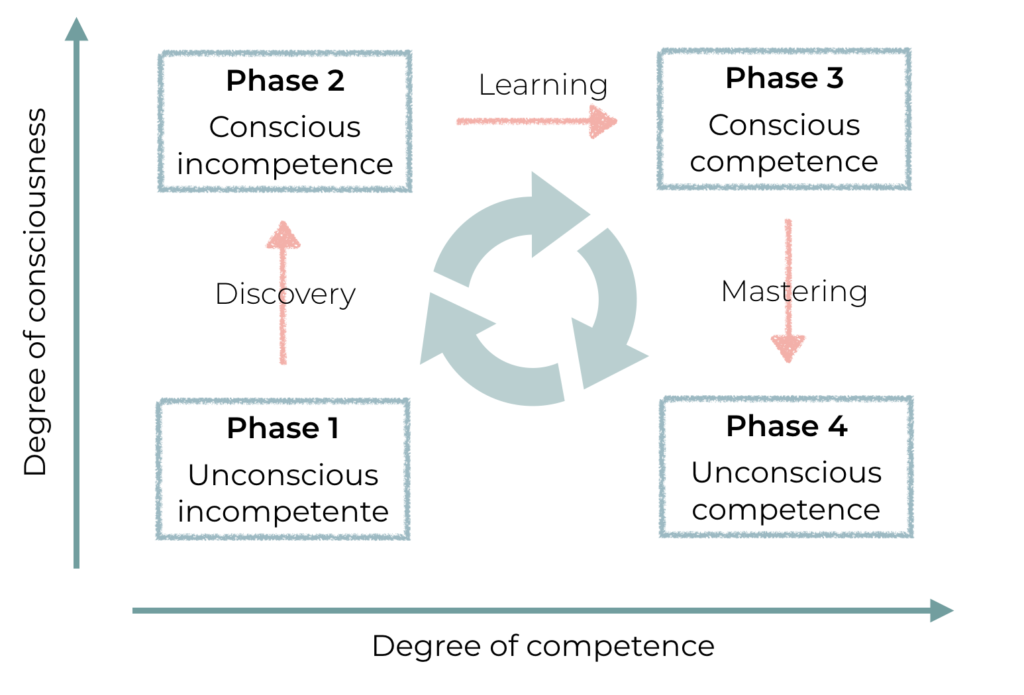In daily life you learn continuously. When you were young, you learned to walk, talk and share your toys, then you learned how to write and count, after that you learn to work together and perhaps play an instrument and in puberty you learn self reflection and you have your first romantic relationship in which you learn a lot too. All these things have in common that learning doesn’t always come easy. Understanding your learning process, can help you learn faster! Below you find how this works!
Learning phases of Maslow

A learning process goes through four phases. The American psychologist Abraham Maslow (1908-1970), also known from the “needs pyramid”, described these phases and are therefore called the learning phases of Maslow. A schematic overview of this circle is found above this article. By keeping these phases in mind, you understand better how you learn and why it is that certain things are harder than other. For example, how do you learn to express your feelings? I use this question as an example to explain the learning phases.
Phase 1: Unconscious incompetence
In this phase you are unaware of a skill and your lack of proficiency. This can feel comfortable and therefore it is a neutral phase.
Example: You do not express your feelings, but you are unaware that you do not do this and that this can help you.
Phase 2: Conscious incompetence
When you are conscious incompetence, you are aware you lack a certain skill and proficiency. You can choose to remain incompetent or you make the choice to learn it. Both choices are ok! When you decide to learn something, you need to train and practise. Learning is probably not ease! In this phase you start practicing and you find out what comes with it, how difficult it can be and how much practice you need. At some moments, you can have the idea that you are never going to learn, what can cause negative feelings.
Example: In your social relationships you realize that you are unable to express your feelings and therefore keep them inside. This can cause difficult situations or even conflicts, because the other person does not know how you feel about something. You realize that this behavior is not helping you and you would like to learn how to express your feelings. You read about it online in this article and this article and you start practicing. You realize this is not easy, it can make you insecure and you really have to push through.
Phase 3: Conscious competence
After frequent training and practicing, you get the hang of your new behavior, it comes more easily! You become aware of the fact that you are getting more and more proficient and that things work out! This can be a nice phase, but also frustrating because you have to practise so much and not always succeed. You still have to put effort and attention to implementing your new behavior. This can take up some energy and some people give up in this phase. Do you suffer from performance anxiety or are you a perfectionist, these tips might help you.
Example: You can express your feelings more easily, both on paper by writing in your NiceDay journal and verbally in conversations with people you trust. Because you want to become even better in expressing your feelings, you ask the help of your best friend and/or partner. You can also ask a NiceDay coach for help if you feel insecure or frustrated, or if you just want some extra help in this process.
Phase 4: Unconscious competence
In this phase performing the skill becomes automatic. You have practiced a lot, might have asked for help, and you are currently unconsciously competent.
Example: Without too much effort, you can express your feelings to your social environment. Because you can do this without too much thought, your social relationships cost less energy, you enjoy more of the conversations and less conflicts arise. Perhaps you want an even deeper connection with someone. With that skill you can walk through the cycle again.
Continuing to learn
You can continuing this learning phases over and over again, because in life you continuously become aware of skills you are not able to do yet and want to learn. Perhaps you want to be more kind to yourself, better handle frustrations or learn how to set boundaries. It helps to realize that in every learning process, you walk through these phases and these are not always easy. Being aware of this makes it easier to push through these phases and keeping it positive!
“In any given moment we have two options: to step forward into growth, or to step back into safety” – Abraham Maslow
NiceDay actions
Do you want to learn something new? Register this in NiceDay and keep track of the phase you are in, and what you think, feel and learn in that phase. This helps you giving insights in your current learning process and may also contribute to you knowing what you need in future learning processes to succeed.











